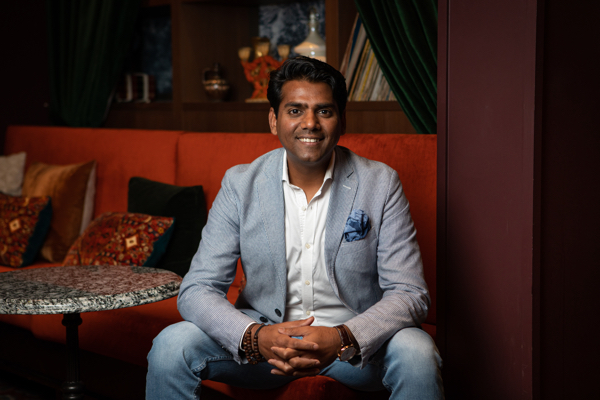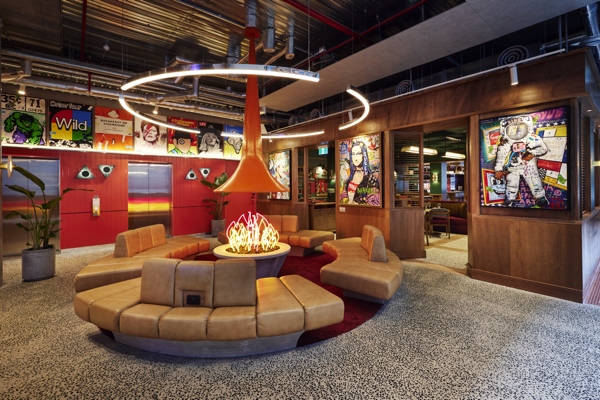The Ovolo Group, an independent lifestyle brand, says it’s ready “to more than double its network” of 13 hotels by expanding further into its main markets of Australia and Hong Kong while moving beyond into other Asia Pacific markets.
After opening its first hotel in Indonesia in 2021, the Hong Kong-based developer (they develop and manage hotels) now wants to move into major urban and leisure destinations in Asia Pacific such as Tokyo, Singapore, Bangkok and Phuket, as well as New Zealand, said Dave Baswal, Ovolo’s recently appointed CEO. The company is even looking into Europe as a destination down the line.
Big plans
Baswal, who was promoted to CEO in March to support Founder and Executive Chairman Girish Jhunjhnuwala’s focus on branding, development, and strategic growth, said Ovolo is looking into acquisitions, management agreements, joint ventures and partnerships. However, the well-spoken Baswal provided few details about its plans for aggressive growth as well as any fundraising specifics. “We don’t want to limit ourselves to do anything, but we need to do it a few steps at a time,” he said.

For expanding beyond its initial footprint, Baswal said the company is particularly interested in working with development partners. “We’re open to doing some management agreements with owners who understand the value of the brand. It is the time to start exploring management opportunities in the Asia Pacific market, especially. We are also open to investor partners, where we have an ability to partner with someone, especially someone who has development opportunities and development know-how because that’s one thing we don’t really know.”
Baswal said Ovolo is happy to bring equity to some of these potential deals and, of course, its operational expertise. “I believe we are ready to go and see that particular side of growth,” he said without offering specifics on pending deals with this arrangement.
Based on what’s being revealed about the company’s expansion plans, Robert Hecker of consultancy Horwath HTL in Singapore, said that what’s being proposed is geared toward more modest growth than the exponential growth that the company is promoting.
“They are talking about partnering with investors as they are keen on expanding and they are willing to put in some ‘pain’ (participation) equity to make it happen,” Hecker said. “But what he is describing is not anything particularly unique. It’s rather common, but those that do find good partners can expand faster than they would otherwise, pursuing only management contract opportunities. It’s a more aggressive approach to growth, but they are not the only ones pursuing such a strategy. Regardless, it cannot be expected to generate exponential growth, only accelerated growth if they succeed in sourcing supportive investment partners.”
Creating a blueprint
The Ovolo Group was founded by entrepreneur Jhunjhnuwala as a serviced-apartment company and in 2010 expanded into hotels as an owner-operator by renovating older properties, designing them in a contemporary fashion and providing services in line with a lifestyle brand. The company expanded into Australia in 2014 and by 2016 Baswal joined the company leading operations and finance and becoming managing director before his most recent promotion.

Baswal said that as a young brand being an owner-operator is a good way for Ovolo to control its destiny.
“When we started, we had a blueprint. We wanted to achieve a certain level of know-how within our own team. So, it’s been a 10-year learning journey where we’ve dealt with heritage buildings and conversions, and changed office buildings into hotels,” Baswal said. “We created a very robust platform, which has the ability to buy assets, repurpose assets, and enhance asset values by the positioning of those assets under the new brand. We are building operating teams, learning asset management capabilities and some basic development abilities as well. Having said that, developing hotels and new buildings is not really our core business.”
By April 2021, their journey led to their first new-build Ovolo in South Yara, a suburb of Melbourne. This came after opening in Bali a year earlier, marking its first operation in the Indonesian market.
Rock ‘n’ roll and vegetarian
One fan of the Ovolo brand and of Jhunjhnuwala is Eric Levy, managing director of Tourism Solutions International, a Singapore-based consultancy.
He said the company created its own brand through a focus on rock ‘n’ roll music and a consumer-centric approach to design and services. Levy is especially intrigued by the company’s food and beverage operations, particularly Jhunjhunwala’s 2020 decision to make all its restaurants and bars completely vegetarian.

“He had the vision to make hotels more fun and treat food and beverage as best in class and not simply meeting the needs of resident guests,” Levy said. “He got his inspiration partially from rock stars and notably David Bowie with his ability to reinvent, adapt, change. He loves his tunes and makes them part of the package. He obviously designs hotels from the consumer side.”
Levy added that it took a lot of courage to make all Ovolo hotels vegetarian. “He’s not trying to be all to everyone. He’s helping to define who his customers will be.”
Quarantine in Hong Kong
While the hotels in Australia are doing well, according to Baswal, Hong Kong is a bit of a different story because of the strict COVID restrictions, which are finally starting to loosen but remain onerous.
Baswal said Ovolo reacted by being a pioneer in providing unique, personal services to travelers who were basically stranded in their hotel rooms. Personal exercise equipment, personal menus, flexible check-out dates and even do-it-yourself Negronis were first initiated by Ovolo and then picked up by its competitors. He does acknowledge that the market remains “pretty turbulent at the moment.”
“We actually looked at quarantine in a very different way and created a program for quarantine travelers by personalizing every guest’s day to the best of our ability with limited touch points,” Baswal said. “I’m proud to say that we’re number one, if not in the top three in this quality space. We’re very well known in Hong Kong to be the best quarantine experience available. We really focused on personalizing and ran a lot of initiatives, a lot of small integrated programs to keep everyone engaged, happy, and healthy over the period. It was very well accepted by the market. So, actually, we had a really good year.”
He acknowledged that Ovolo would rather be dealing with more transient and leisure travelers and relieve its staff of all the extra work required to keep COVID-stranded guests happy.
“From the brand’s point of view, it’s a lot of trouble. The market is hard. And it’s a different kind of business. It’s hard for housekeeping. It’s hard for beverage. It’s very hard for the teams. But within the adversity of what we can control, I think we’ve done very well,” he said.
The future
Levy sees Ovolo as a well-positioned, lively and engaging lifestyle brand that pays particular attention to its food and beverage operation. He added that the markets where it plans to expand are ideal for its clients in Australia and Hong Kong, who are frequent visitors to Singapore, Kuala Lumpur, Lombok, Phuket and Japan. As a result, Levy believes the brand has the potential to meet its aggressive growth plans.
“They could double (the number of hotels) in the next three or four years and then probably again before a decade passes, but they would have to commit the requisite resources,” Levy said. “Also, it will be interesting to see how they evolve from being a hotel investor to being more of a third-party manager.”
Yes, Levy likes the progressive nature of the group – from creating their own brand for amenities to going vegetarian and for having a ‘cool’ ambiance and corporate social responsibility programs. “I look at the financial implications of things like this and love to think about the food costs and retail opportunities,” he said. “So, yes, I do see significant potential for the group.”
